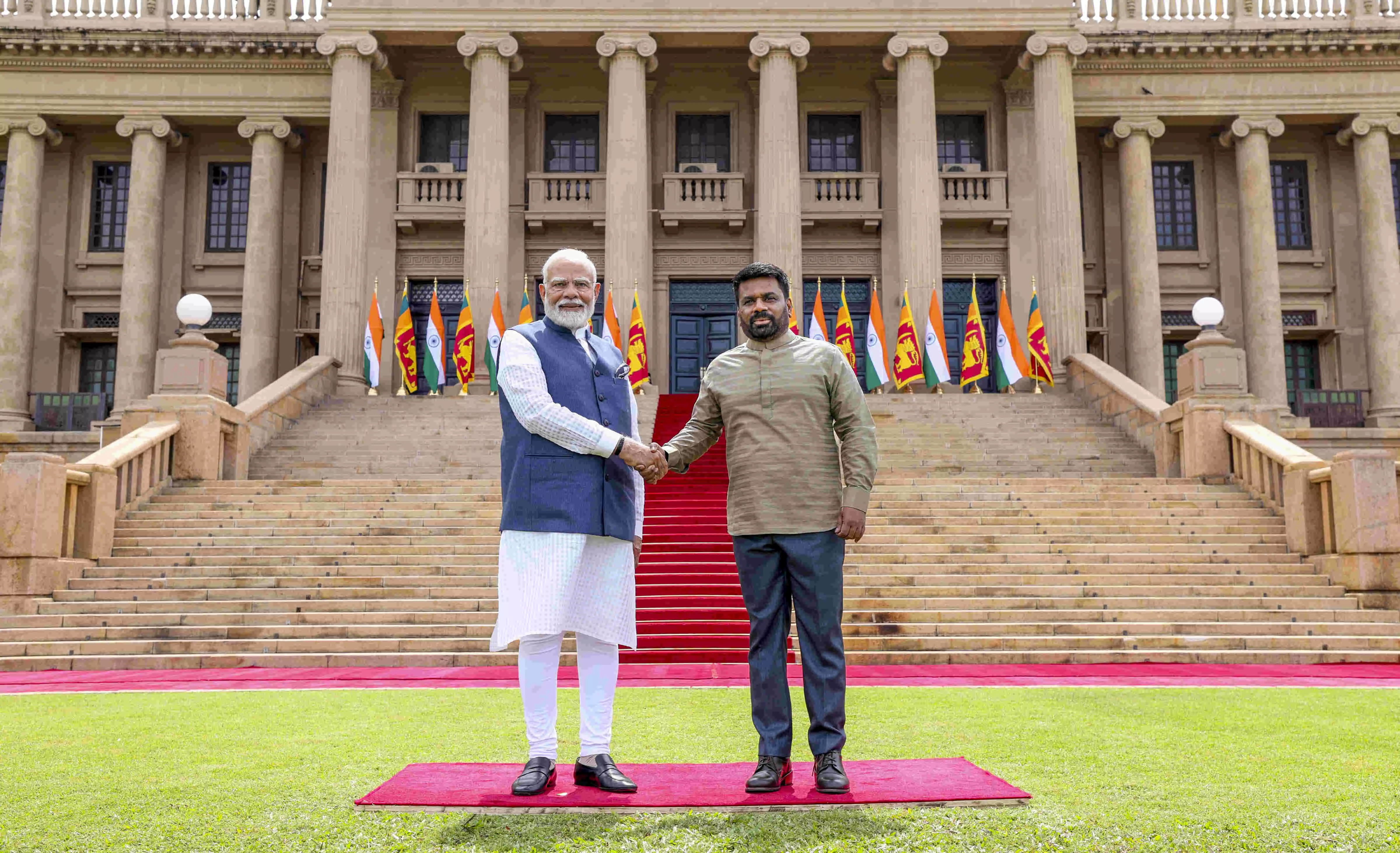India, Sri Lanka ink major defence pact after talks between PM Modi and President Dissanayake

Colombo: For the first time, India and Sri Lanka on Saturday inked a major defence pact to institutionalise a framework for deeper engagement in the military domain with Prime Minister Narendra Modi asserting that security of both the nations is interlinked and dependent on each other.
Following talks between PM Modi and Sri Lankan President Anura Kumara Dissanayake, the two sides firmed up a total of seven pacts, including one on developing Trincomalee as an energy hub and another on power grid connectivity.
In the meeting, the prime minister pitched for resolving the vexed fishermen issue between the two countries with a “humane approach” and hoped that Colombo will fulfil the aspirations of the Tamil people and conduct provincial council elections.
In other significant moves, India also firmed up debt restructuring agreements as part of economic assistance for Colombo and decided to reduce interest rates on loans with Modi reaffirming that India stands with the people of the island nation.
For the social and economic development of the Eastern provinces of Sri Lanka, a support package of approximately 2.4 billion Lankan rupees will be provided, Modi announced.
Though the Modi-Dissanayake talks produced over 10 concrete outcomes, the defence cooperation pact emerged as the centerpiece as it signalled an upward trajectory in defence relations leaving behind the bitter chapter of India pulling out its peacekeeping forces from the island nation around 35 years ago.
In his remarks, Dissanayake said he assured PM Modi that Sri Lanka will not allow its territory to be used in any manner inimical to India's security interests.
“We believe that we have shared security interests. The security of both countries is interconnected and co-dependent,” Modi said in his media statement.
“I am grateful to President Dissanayake for his sensitivity towards India’s interests. We welcome the important agreements made in the area of defence cooperation,” he said.
The prime minister said relations between India and Sri Lanka are based on mutual trust and goodwill and both sides will continue to work together to fulfill the hopes and aspirations of people of the two countries.
“President Dissanayake chose India for his first foreign visit after becoming president, and I have had the privilege of becoming his first foreign guest. This is a symbol of the depth of our special relations,” Modi said.
“Sri Lanka has a special place in both our 'Neighbourhood First Policy' and Vision 'MAHASAGAR'. In the last four months, since President Dissanayake's visit to India, we have made significant progress in our cooperation,” he added.
Modi announced the vision MAHASAGAR or 'Mutual and Holistic Advancement for Security and Growth Across Regions' for India’s engagement with the Global South during his recent visit to Mauritius.
After their talks, Modi and Dissanayake also virtually inaugurated the Sampur solar power plant.
“The Sampur solar power plant will help Sri Lanka achieve energy security. The agreement reached to build a multi-product pipeline, and to develop Trincomalee as an energy hub will benefit all Sri Lankans,” Modi said.
“The grid interconnectivity agreement between the two countries will create opportunities for Sri Lanka to export electricity,” he added.
Modi said India will also provide support for the Sri Lanka Unique Digital Identity project.
In his remarks, the prime minister also referred to the fishermen issue.
“We also discussed issues related to fishermen's livelihood. We agreed that we should proceed with a humane approach in this matter,” he said. “We also emphasised on immediate release of the fishermen and their boats.”
Referring to the Tamil issue, the prime minister also hoped that the Sri Lankan government will “fully implementing” the Constitution of the country.
“We also talked about reconstruction and reconciliation in Sri Lanka. President Dissanayake appraised me of his inclusive approach,” Modi said.
“We hope that the Sri Lankan government will meet the aspirations of the Tamil people and fulfil its commitment towards fully implementing the Constitution of Sri Lanka, and conducting provincial council elections,” he said.
The Tamil community in Sri Lanka has been demanding the implementation of the 13th Amendment that provides for devolution of power to it. The 13th Amendment was brought in after the Indo-Sri Lankan agreement of 1987.
Modi also talked about India's assistance to Sri Lanka to help it come out of the economic stress.
“In the last six months alone, we have converted loans worth more than USD 100 million into grants. Our bilateral ‘debt restructuring agreement’ will provide immediate assistance and relief to the people of Sri Lanka. Today, we have also decided to reduce interest rates,” he said.
“It symbolises that even today, India stands with the people of Sri Lanka,” he said.
The prime minister also talked about the Buddhist links between the two nations.
“I am extremely happy to announce that the Holy Relics of Lord Buddha found in 1960, in the Aravali region of my home state - Gujarat, are being sent to Sri Lanka for an exposition,” he said.
“India will assist in the renovation of the Thirukoneswaram temple in Trincomalee. India will also provide support in the construction of the sacred city in the Anuradhapura Mahabodhi temple complex, and the Sita Eliya temple in Nuwara Eliya,” he added.
The Modi-Dissanayake talks were held a day after the prime minister arrived in the Sri Lankan capital after concluding his trip to Bangkok where he attended a summit of the BIMSTEC (Bay of Bengal Initiative for Multi-Sectoral Technical and Economic Cooperation).



